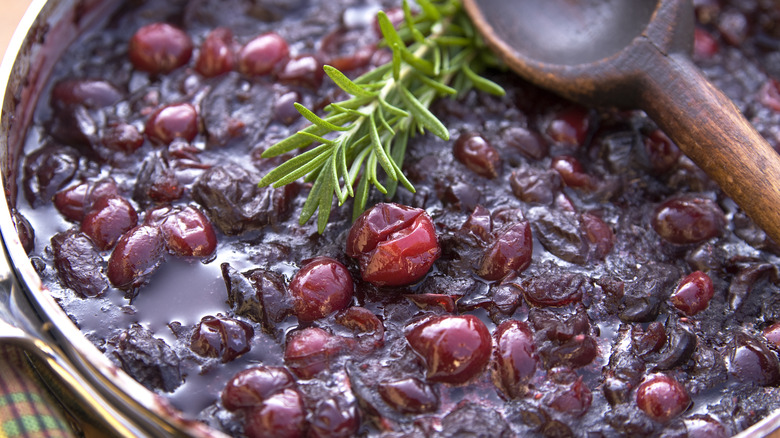Andrew Zimmern's Budget Hack For Thanksgiving Cranberry Sauce – Exclusive
Turkey season has almost commenced, which means it's time to start thinking about what's going to be on the dinner menu. A classic annual side dish, like cranberry sauce, can actually be prepped for way ahead of the Thanksgiving holiday (and doing this may save you a little bit of money, too). Famous food personality, Andrew Zimmern, is already in holiday mode and has revealed his budget hack for cranberry sauce in an exclusive interview with Mashed.
If you are opting for homemade cranberry sauce instead of canned, fresh fruit might seem like the more appealing choice. However, Zimmern recommends ditching the fresh cranberries and stocking up on frozen ones before the prices start to skyrocket in November. Plus, you may find that they are frozen at the height of freshness, preserving certain nutrients as well. Zimmern begs the ultimate question that cooks wrestle with often, "Why not use the frozen products and save the money?"
Frozen cranberries are just as good as the fresh
The "Bizarre Foods" host told Tasting Table, "I'm talking about whole fruit — not sweetened, just the cranberries themselves." Zimmern continued, "There are going to be frozen cranberries from last year that are going to be in grocery freezers, and if you're making sauce from them, they're going to break down when you're cooking them anyway." In 2022, as folks readied for Thanksgiving, a cranberry shortage plagued the United States.
This year, the farmers (as well as society in general) are dealing with higher economic pressures — increased fertilizer and fuel prices are just a few of the obvious issues. Zimmern predicts that cranberries are "going to be very expensive this year" due to the fact that the "two big states that were producing cranberries had fairly dry summers." New Jersey, Massachusetts, Oregon, Wisconsin, and Washington are among the major North American production areas. Notably, Chelmer Foods reported that in Wisconsin, one of the world's top cranberry producers, growers have dealt with "intense heat" and cold stretches.

